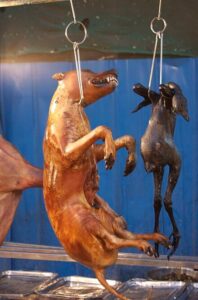Do you know Chinese takeout restaurants have a larger presence than McDonald’s in the United States? So chances are, you are no stranger to Chinese food.
A friend once told me she only orders shrimp from Chinese restaurants because she’s afraid of getting some sort of “mystery meat”. So what meat does Chinese restaurant really use? It’s a rather simple answer — whatever you see on the menu. No “mystery meat” goes into the kitchen!
### You’ll Get What’s On The Menu ###
I can’t say this for sure, but at least in the U.S., if you order from Chinese restaurants, you’ll be getting what it says on the menu.
Think about it, which is more common to source, cat and dog meat or chicken and beef? Are there any factories specializing in “breaking down” those “other” animals? Wouldn’t it be easier and cheaper to just buy pre-packaged chicken, beef or pork in bulk?
Besides, there are animal cruelty laws and regulations in each state dealing with animal abuse or animal cruelty. If you kill someone’s pets intentionally, for example, you are probably responsible for the owner’s economic damage, noneconomic and punitive damage, and emotional distress. That’s a lot of costs. Who would want to do that?
### The Mystery Behind “Mystery Meat” ###
The popular urban legend that Chinese restaurants use really cheap meat, such as cat, dog or rat meat, has been around for decades. It was originated from the belief that Chinese people eat cat, dog, rat or pretty much anything.
What I believe is that without understanding the history behind it and jumping to the conclusion is simply not fair, or at the very least ignorant origin.
Over 4,000 years ago, Chinese practitioners of folk medicine believe that dog meat would help ward off the heat through the summer months. But that belief was not widespread enough to affect ordinary Chinese people.
In the late 1950s, China had gone through a catastrophic time in history — the Great Chinese Famine. It lasted for three years and millions of people died. These people were forced to eat everything, from cats, dogs, rats, tree bark, to corpses of their neighbors. Scary, right? But it’s true. It’s so sad that those people had to consume anything in desperation during extreme poverty. It won’t be difficult to find similar stories happened in other countries, such as this one during World War II.
### Culture Influence And Dog Meat Festival ###

As previously discussed, the economy was the main force in people eating “mystery meat” in the Great Chinese Famine. So with China’s economy growing strong nowadays, do Chinese people still eat “mystery meat”?
The answer is Yes and No.
The good news is the majority of Chinese people don’t eat those meat anymore. They have better and healthier choices — beef, lamb, chicken, fish, pork. Chinese people especially love pork. My favorite is braised pork belly. Other famous dishes include shredded pork with garlic sauce, double cooked pork slices, sweet and sour pork ribs, braised pork trotters, etc.
However, there is still a small percentage of people in Guangdong and Guangxi Provinces eat dog and cat. They think cat meat is a good warming food during winter and eating dog meat is a way to celebrate the summer solstice. One of their winter dishes is called “dragon, tiger, phoenix” (snake, cat, chicken). It’s really a regional thing. (see picture below).
The Dog Meat Festival, celebrated annually in Yulin, Guangxi Province, is a controversial event in China. The local residents and festival organizers think dogs are no different than pigs or cows. The holiday lasts for 10 days during which an estimate of 10,000-15,000 dogs is consumed. Dogs are paraded in wooden crates and metal cages, beaten to death with metal bars, skinned and boiled alive.
### Animal Rights Fighter in China ###
I know how scary it sounds and looks. As a dog lover, that breaks my heart. Fortunately good overcomes evil in this crazy world.
Yulin’s government denies any official involvement or endorsement of the festival. It describes the event as a local custom observed by a small percentage of Yulin’s residents. Many animal lovers even pay from their own pocket to rescue dogs and cats from the festival. Millions of Chinese voted in support of a legislative proposal to ban the dog meat trade.
Yulin’s new Communist Party Secretary Mo Gongming was determined to improve Yulin’s national and world reputation. In 2017, the Yulin government has temporarily banned the city’s dog meat trade for one week. Penalties include a fine of up to $14,500 and jail time.
### Animal Welfare Concerns ###
However, China’s animal welfare and rights still remain an area of concern. Compared to other developed countries, China has limited animal protections by international standards. There are currently no nationwide laws in China to explicitly prohibit and punish the mistreatment of animals. Even though several drafts and proposals were introduced, they didn’t move forward.
The Chinese government considers economic growth and political stability are more important. Local officials are evaluated based on local jobs and revenue. This has led to less concern for animal welfare.
However, Chinese people’s attitude toward dogs are shifting. As China becomes wealthier, dogs have become popular pets among the country’s middle and upper class. Even farmers living in rural areas have dogs. They strongly believe cats and dogs are important family members. In major cities, it’s common to see poodles, golden retrievers, huskies and Pekingese walking down the street or playing in the dog park. Dog clothing and grooming shops are everywhere.
### Media Wants Attention ###
As a bridge to connect the world, media can help us reach every corner of the world in the comfort of our own home. However, it can also be a source of fake news and biased information. It makes conscious decisions on what to report on and what not. As China grows stronger, its enemies can’t stay calm anymore by using media as an invisible weapon to hurt China’s reputation.
It is embarrassing and unfair to most Chinese people that the world wrongly believes that the brutally cruel Yulin festival is part of Chinese culture. As I mentioned earlier, only a small percentage of Yulin residents eat dog and cat meat. That number becomes even smaller when compared to the vast population in China.
Believe it or not, many countries eat dogs and cats. For example, in India, cat meat is served when a male child is born. In South Korea, there are specialty “dog meat” restaurants where it is advertised on signs in the eatery’s windows. It’s especially popular among a particular group of old men for its supposed power to enhance stamina and virility. Cat and dog meat is eaten in Vietnam, even though it is technically illegal.
But how often do you hear people say these countries eat “mystery meat”? Media has lead people to believe whatever it needs to say, without presenting the whole story.
### Final Words ###
So what do you think? I hope this article helps to clarify things a bit. This is just my personal opinion as a native Chinese. I love the wide range and dynamics of authentic Chinese cuisine, in which we use all common meat and different cooking techniques to make it different from any other types of food in the world. Even though we may eat some weird stuff, such as chicken feet, beef tongue, pig trotter, etc, it’s still within a normal range. We just love to explore!
Now don’t worry about getting “mystery meat” and go ahead to order your favorite Chinese food! Enjoy!

